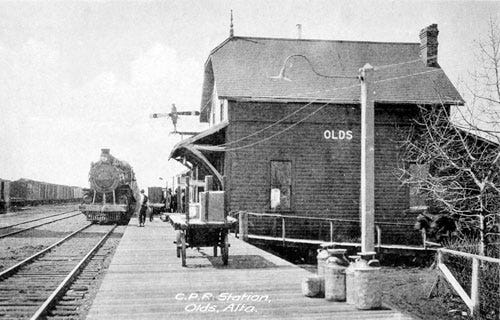The CPR, as well as other railroads like the Grand Trunk, were extremely important in the founding of many communities in the Canadian Prairies.
Unfortunately, those railroad companies often held an iron grip on a community and could dictate if it lived or died. They also owned large parts of the community, giving the railroad a lot of power.
For the community of Olds, the power of the railroad over town affairs led to a battle, so to speak, in the community.
It all began in 1904 when the town received permission to build a second railway line crossing a block north of the existing crossing near the station. The cost of the installation of this new crossing cost $500, no small amount, and it would have helped the townspeople as the main crossing was closed for long periods by standing trains. Three years later, the CPR decided to get rid of that second crossing, but the people of Olds were not happy about this.
On May 1907, section men arrived from Red Deer in the night to remove the crossing but people in town met them at the crossing and chased them off. A few nights later, another attempt was made and this one was foiled as well.
Then, on June 3, 1907, Mayor Dean received a call that a train had left Calgary, coming to Olds, with eight cars of gravel and 50 men. Among them were CPR detectives and 12 police armed with guns. Dean consulted with his council and they decided to fight this action and 20 men were sworn in as special constables to prevent disorder. Word spread around town and before long, 500 people were around the tracks waiting to see what trouble transpired. Several carried handguns and shotguns.
At noon on June 3, the mayor met the train at Olds. The superintendent stated that the crossing was to be closed at once, but the mayor stated that the crossing was built with the CPR’s permission and that they would fight to preserve what was the property of Olds.
It was decided that they would sit down for lunch but only a few minutes after the men sat down for lunch, word came that citizens of the town were fighting with the 50 workmen. Two special constables were attempting to arrest the superintendent, and the workmen were wielding their shovels and pickaxes like weapons.
The police then ordered the townspeople to disperse or he would give the order to shoot. The mayor, seeing the danger, ordered the citizens to leave the right away.
And with that, the battle died down, and by all accounts, the crossing stayed.




